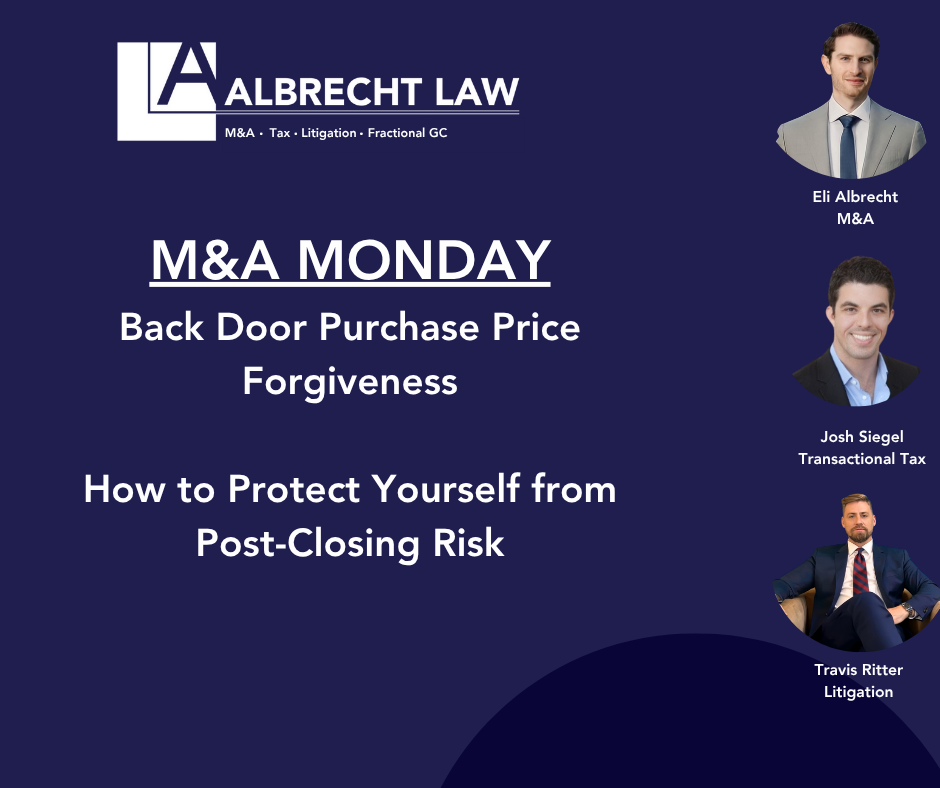M&A Monday: Back Door Purchase Price Forgiveness

May 13, 2025
by a professional from Georgetown University in Maryland, USA
 How to protect yourself from a post-closing risk.
Last week an Independent Sponsor came me to submit an LOI. She was concerned about a customer concentration risk. I suggested an earnout or holdback, but she said she is competing against a PE-backed Strategic and the broker explicitly said, no earnout.
I said, okay, next best thing is Backdoor Purchase Price Forgiveness.
Almost every acquisition faces risks – unreliable financials, customer concentration, key employees, seller reliance, etc. Our preference is to protect ourselves with a contingent piece of the purchase price (i.e., earnout, forgivable seller note, holdback, escrow). For example, an earnout that is only achieved if X revenue is achieved. If not, the purchase price is retroactively returned to where it should be (https://www.linkedin.com/pulse/ma-monday-structuring-contingent-purchase-price-eli-albrecht-zizfc/).
While this explicit contingency is best, it often has to be included in an LOI and will make a buyer’s offer less competitive. Almost every seller believes they will never see any portion of the purchase price paid after closing.
The next best thing, I call, Backdoor Purchase Price Forgiveness. We achieve this through an explicit covenant that survives after closing with indemnification offsets against the purchase price (a covenant is a commitment that lasts into the future). As an easy example, this is regularly used for non-compete/non-solicit/non-disparage covenants (Restrictive Covenants). The purchase agreement restricts seller from competing after closing in a Covenant. If that covenant is breached, we have an indemnification claim for buyer to reclaim losses. Those losses are then offset from a promissory note, pulled from an escrow, or paid by seller directly – in each case retroactively reducing the purchase price.
Covenants can be drafted to include key customers, key employees, financial performance, or anything else. Then, make sure your indemnification offsets and recourse is tight and you have, backdoor purchase price forgiveness. Furthermore, there is no cap or basket (https://x.com/Eli_Albrecht/status/1762228046403170358) on breaches of covenants.
This can be and is often done for representations and warranties, but those reps and warranties only guarantee the state of affairs at and prior to closing – not after closing (https://x.com/Eli_Albrecht/status/1816111570189234401).
A seller’s counsel will sometimes push back on these covenants, but they are addressed far later in the process rather than at the LOI stage and often we can arrive at a compromise position when the seller and buyer have built a better relationship.
Finally, this needs to be drafted precisely in the purchase agreement by your lawyer and if there are any post-closing litigations or disputes, contact Travis Ritter, our Litigation Chair to discuss your matter.
How to protect yourself from a post-closing risk.
Last week an Independent Sponsor came me to submit an LOI. She was concerned about a customer concentration risk. I suggested an earnout or holdback, but she said she is competing against a PE-backed Strategic and the broker explicitly said, no earnout.
I said, okay, next best thing is Backdoor Purchase Price Forgiveness.
Almost every acquisition faces risks – unreliable financials, customer concentration, key employees, seller reliance, etc. Our preference is to protect ourselves with a contingent piece of the purchase price (i.e., earnout, forgivable seller note, holdback, escrow). For example, an earnout that is only achieved if X revenue is achieved. If not, the purchase price is retroactively returned to where it should be (https://www.linkedin.com/pulse/ma-monday-structuring-contingent-purchase-price-eli-albrecht-zizfc/).
While this explicit contingency is best, it often has to be included in an LOI and will make a buyer’s offer less competitive. Almost every seller believes they will never see any portion of the purchase price paid after closing.
The next best thing, I call, Backdoor Purchase Price Forgiveness. We achieve this through an explicit covenant that survives after closing with indemnification offsets against the purchase price (a covenant is a commitment that lasts into the future). As an easy example, this is regularly used for non-compete/non-solicit/non-disparage covenants (Restrictive Covenants). The purchase agreement restricts seller from competing after closing in a Covenant. If that covenant is breached, we have an indemnification claim for buyer to reclaim losses. Those losses are then offset from a promissory note, pulled from an escrow, or paid by seller directly – in each case retroactively reducing the purchase price.
Covenants can be drafted to include key customers, key employees, financial performance, or anything else. Then, make sure your indemnification offsets and recourse is tight and you have, backdoor purchase price forgiveness. Furthermore, there is no cap or basket (https://x.com/Eli_Albrecht/status/1762228046403170358) on breaches of covenants.
This can be and is often done for representations and warranties, but those reps and warranties only guarantee the state of affairs at and prior to closing – not after closing (https://x.com/Eli_Albrecht/status/1816111570189234401).
A seller’s counsel will sometimes push back on these covenants, but they are addressed far later in the process rather than at the LOI stage and often we can arrive at a compromise position when the seller and buyer have built a better relationship.
Finally, this needs to be drafted precisely in the purchase agreement by your lawyer and if there are any post-closing litigations or disputes, contact Travis Ritter, our Litigation Chair to discuss your matter.
from Georgia Southern University in Charleston, SC, USA